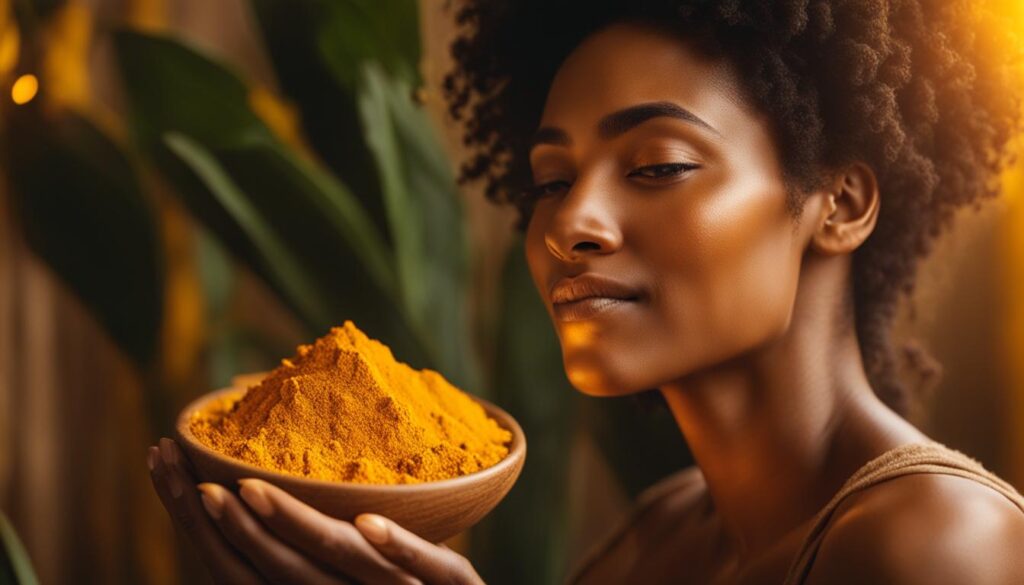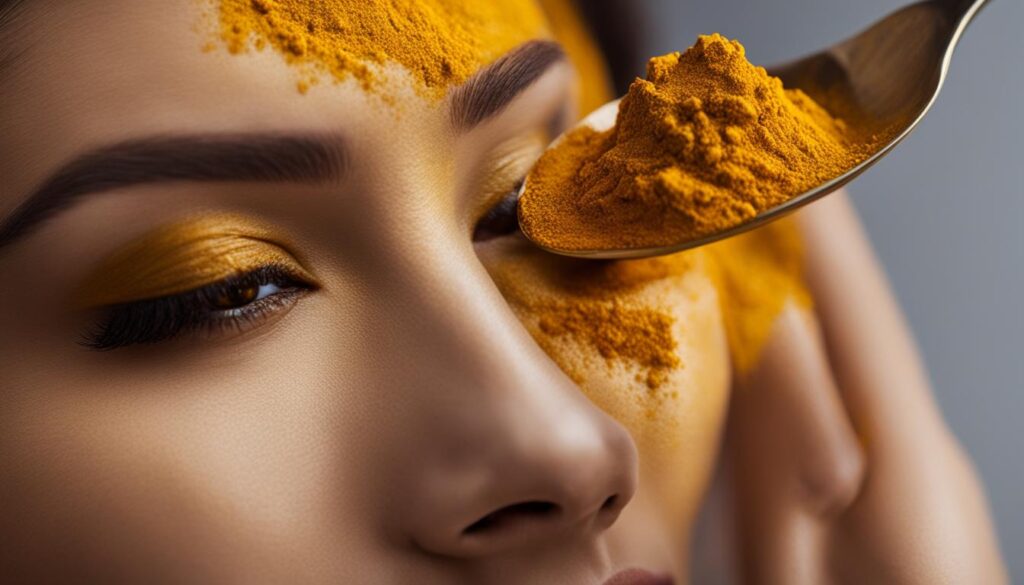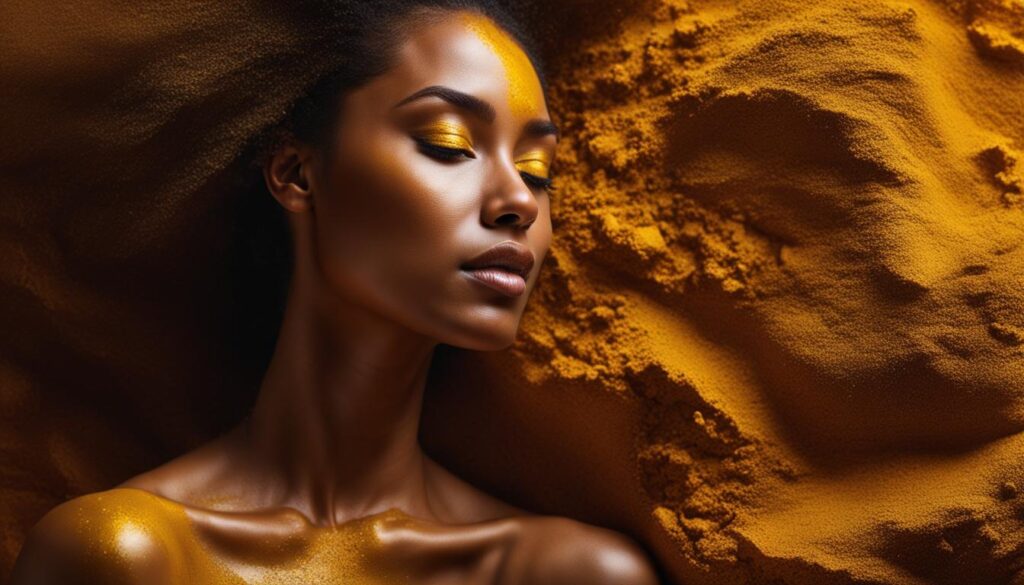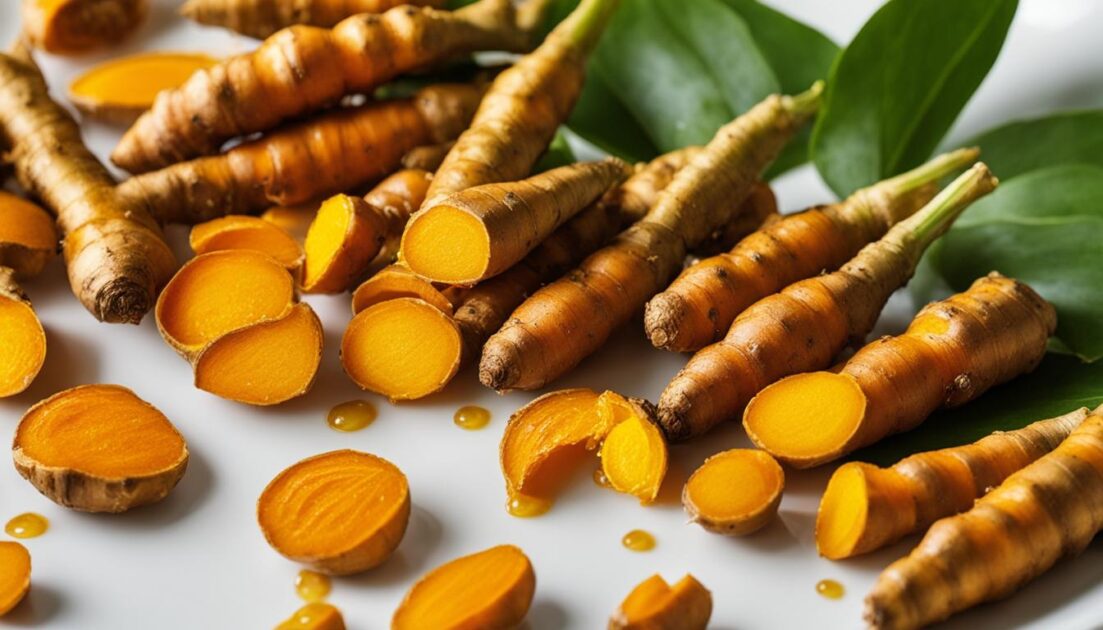Discover the incredible skincare benefits of turmeric and unlock the secret to achieving healthy, radiant skin. From fading dark spots to managing acne, turmeric, along with other natural ingredients, can transform your complexion for a luminous glow.
Key Takeaways:
- Turmeric is packed with powerful properties that can brighten the complexion and even out skin tone.
- It contains curcumin, an antioxidant and anti-inflammatory compound, which can manage acne and fade dark spots.
- The nourishing properties of turmeric promote healthy skin cell regeneration and reduce the appearance of fine lines and wrinkles.
- Combining turmeric with complementary ingredients like carrot and honey can help reduce skin discolorations and hyperpigmentation.
- Turmeric’s antimicrobial properties make it an excellent natural remedy for acne-prone skin.
The Power of Turmeric for Radiant Skin
Turmeric has been widely used in traditional medicine for centuries due to its powerful properties. It contains curcumin, which is an antioxidant and anti-inflammatory compound that can brighten the complexion, fade dark spots, even out skin tone, and manage acne. Its antibacterial properties make it an excellent choice for those with problematic or blemish-prone skin. Incorporating turmeric into your skincare routine can ensure your skin reaps the benefits of this golden spice.
Curcumin, the active ingredient in turmeric, provides a plethora of benefits for the skin. Its antioxidant properties help combat free radicals, which contribute to premature aging. By neutralizing these free radicals, turmeric can help diminish the appearance of fine lines and wrinkles, giving your skin a more youthful appearance. Additionally, its anti-inflammatory properties can calm and soothe irritated or inflamed skin, reducing redness and promoting an even skin tone.
One of the standout benefits of turmeric for the skin is its ability to fade dark spots and hyperpigmentation. The brightening properties of turmeric can help reduce the intensity of dark spots, revealing a more luminous and even complexion. Whether caused by sun damage or hormonal changes, turmeric can be a powerful ally in lightening these pesky spots.

Turmeric for Acne-Prone Skin
Acne is a common skin concern for many individuals, and turmeric can assist in managing breakouts. Its antibacterial properties help combat acne-causing bacteria, reducing the occurrence of new blemishes. Turmeric’s anti-inflammatory properties can also calm existing acne, minimizing redness and swelling. Incorporating turmeric into your skincare routine can help you achieve a clearer complexion and soothe blemish-prone skin.
How to Use Turmeric in Skincare
There are various ways to incorporate turmeric into your skincare routine and harness its benefits. Consider creating a DIY turmeric face mask by combining turmeric powder with honey or yogurt. This mask can be left on the skin for 10-15 minutes to promote a healthy, radiant glow. Additionally, you can add a small amount of turmeric powder to your regular face cleanser or moisturizer to enhance its effects.
| Benefits of Turmeric for Radiant Skin | How to Incorporate Turmeric |
|---|---|
| Brightens the complexion | Create a DIY face mask with turmeric, honey, and yogurt |
| Fades dark spots and hyperpigmentation | Add a pinch of turmeric powder to your regular cleanser or moisturizer |
| Reduces acne and inflammation | Apply a turmeric face mask for 10-15 minutes, then rinse it off |
When using turmeric topically, be cautious as it can stain fabrics and temporarily tint the skin yellow. To prevent staining, consider performing a patch test prior to applying turmeric to your face and be mindful of clothing and towel choices. Incorporating turmeric into your skincare routine can unlock the radiant skin you’ve always desired.
Turmeric for Nourishing and Youthful Skin
Turmeric possesses remarkable nourishing properties that can contribute to achieving youthful and radiant skin. Packed with essential vitamins and beta-carotene, turmeric promotes healthy skin cell regeneration, protects against environmental damage, and enhances elasticity.
The combination of vitamins A, C, and E found in turmeric aids in maintaining the health and vitality of your skin. Vitamin A stimulates collagen production, helping to reduce the appearance of fine lines and wrinkles. Vitamin C acts as a potent antioxidant, neutralizing free radicals that contribute to premature aging. Lastly, vitamin E nourishes the skin, providing deep hydration and combating dryness.
Incorporating turmeric into your skincare routine can rejuvenate and nourish your skin, leaving you with a vibrant and youthful complexion.
Additionally, beta-carotene, a natural pigment found in turmeric, is a precursor to vitamin A. It helps protect the skin against harmful UV rays and environmental pollutants. Beta-carotene also supports the skin’s natural repair process, reducing the signs of aging, and promoting a more youthful appearance.
To illustrate the nourishing properties of turmeric, here is a complete table summarizing its key nutrients:
| Nutrient | Benefits |
|---|---|
| Vitamin A | Promotes healthy skin cell regeneration and reduces the appearance of fine lines and wrinkles. |
| Vitamin C | Acts as a potent antioxidant, neutralizing free radicals and supporting collagen production. |
| Vitamin E | Provides deep hydration, improves skin elasticity, and combats dryness. |
| Beta-carotene | Protects against UV damage, environmental pollutants, and supports natural repair processes. |

Turmeric for Reducing Skin Discoloration
The combination of turmeric, carrot, and honey can be highly effective in reducing skin discolorations and hyperpigmentation. Turmeric’s brightening properties, carrot’s vitamin A content, and honey’s healing abilities work together to fade dark spots and even out skin tone, resulting in a more uniform complexion over time. Adding turmeric to your skincare routine can help address skin discolorations.
If you’re dealing with skin discoloration or hyperpigmentation, incorporating turmeric into your skincare routine can be a game-changer. Not only does it provide natural and effective results, but it also offers additional benefits for your skin’s overall health.
| Turmeric Benefits for Reducing Skin Discoloration |
|---|
| Turmeric’s brightening properties help to fade dark spots and even out skin tone. |
| Carrot’s vitamin A content promotes skin cell turnover, aiding in the reduction of hyperpigmentation. |
| Honey’s healing abilities help to soothe and repair the skin, improving its overall appearance. |
By incorporating turmeric into your skincare routine, you can experience the transformative effects it has on reducing skin discoloration and hyperpigmentation.
How to Use Turmeric for Skin Discoloration
There are a few different ways you can use turmeric to target skin discoloration:
- Create a DIY face mask by mixing turmeric powder, carrot juice, and honey. Apply the mask to cleansed skin, leaving it on for 10-15 minutes before rinsing off with lukewarm water.
- Add a pinch of turmeric powder to your favorite moisturizer or serum and apply it to your face and neck.
- For a more targeted approach, make a paste with turmeric powder and a few drops of water, and apply it directly to dark spots or areas with hyperpigmentation.
Remember to perform a patch test before using turmeric on your skin to ensure you don’t have any adverse reactions. Additionally, turmeric has the potential to stain clothing and surfaces, so be cautious when applying it and remove any excess residue thoroughly.

“Turmeric, along with its powerful combination of natural ingredients like carrot and honey, can significantly reduce skin discolorations and hyperpigmentation.” – Beauty Expert
Turmeric for Acne-Prone Skin
Turmeric’s antimicrobial properties make it a natural remedy for acne-prone skin. It fights against acne-causing bacteria and reduces inflammation and redness associated with breakouts. Turmeric can also regulate sebum production and balance oil levels, preventing acne breakouts. While it can reduce redness and inflammation, there is no research to suggest it has an effect on deep or pitted acne scars.
If you struggle with blemish-prone skin, incorporating turmeric into your skincare routine can help keep breakouts at bay and promote a clearer complexion.
Turmeric for Acne-Prone Skin Benefits:
| Benefits | Description |
|---|---|
| Antimicrobial properties | Fights against acne-causing bacteria |
| Reduces inflammation | Soothes redness associated with breakouts |
| Regulates sebum production | Helps balance oil levels to prevent acne |
“I’ve struggled with acne for years, and turmeric has been a game-changer for me. Not only does it reduce the redness and inflammation, but it also keeps my breakouts in check. It’s a must-have ingredient in my skincare routine.” – Lisa, skincare enthusiast
Turmeric for Anti-Aging
Turmeric has amazing anti-aging properties that can help you achieve more youthful and rejuvenated skin. Its potent components stimulate collagen production, improving skin elasticity and reducing the appearance of wrinkles and sagging.
Turmeric also acts as a powerful antioxidant against free radicals, protecting your skin from damage and premature aging. By inhibiting the breakdown of elastin, a protein responsible for maintaining skin’s elasticity, turmeric helps to preserve its bounce and firmness.
Furthermore, turmeric enhances the skin’s moisture barrier, addressing concerns of dryness and dullness that often accompany the aging process. Its hydrating effects promote a more radiant and glowing complexion.
Incorporating turmeric into your skincare routine can be as simple as using a turmeric-infused face mask or adding a pinch of turmeric to your moisturizer. You can also try incorporating turmeric into your diet or taking turmeric supplements to support your skin’s health from within.
Remember, consistency is key when using turmeric for anti-aging benefits. Regular use, combined with a comprehensive skincare routine and a healthy lifestyle, can help you achieve the best results.
How to Incorporate Turmeric Into Your Skincare Routine
There are various ways to incorporate turmeric into your skincare routine. You can create a DIY face mask by combining turmeric powder with honey or yogurt. Applying this mask to cleansed skin for 10-15 minutes can provide multiple benefits. Alternatively, adding a pinch of turmeric to your moisturizer or treatment product can enhance its effects. However, it’s important to perform a patch test and be cautious of staining.
DIY Turmeric Face Mask Recipe
Try this simple DIY face mask recipe to reap the benefits of turmeric:
- Mix 1 teaspoon of turmeric powder with 1 teaspoon of raw honey or plain yogurt.
- Apply the mixture evenly to your face, avoiding the delicate eye area.
- Leave the mask on for 10-15 minutes.
- Rinse off with warm water and pat your skin dry.
Remember, turmeric has a vibrant yellow color that may stain fabrics and surfaces. Be sure to wear old clothes and protect your surroundings while using turmeric-based skincare products.
Turmeric-infused Moisturizer
An easy way to incorporate turmeric into your daily skincare routine is by adding a pinch of turmeric powder to your moisturizer or treatment product. Mix well and apply as usual. This will enhance the effects of your product and provide an extra boost of antioxidant and anti-inflammatory properties.
It’s essential to perform a patch test before applying any new product to your face, especially if you have sensitive skin. Apply a small amount of the turmeric-infused moisturizer to a small area on your forearm and wait for 24 hours. If there is no adverse reaction or irritation, you can safely incorporate it into your routine.
When using turmeric in skincare, it’s important to note that results may vary for each individual. Consistent usage and patience are key to achieving optimal results. If you have any concerns or experience any adverse reactions, consult a dermatologist.
Tips for Using Turmeric for Maximum Results
When it comes to harnessing the full potential of turmeric for your skin, there are a few tips and best practices to keep in mind. Follow these guidelines to maximize the benefits of using turmeric in your skincare routine.
To start, always choose high-quality turmeric powder or fresh turmeric root. Look for reputable brands or opt for organic turmeric to ensure you’re getting the most potent and effective product.
Before applying turmeric to your face, it’s essential to perform a patch test on a small area to check for any allergic reactions or sensitivity. Turmeric has a vibrant yellow color that can stain the skin temporarily, so be cautious and use it sparingly.
To enhance the benefits of turmeric on your skin, consider combining it with other complementary ingredients. Honey, yogurt, lemon juice, aloe vera gel, or coconut oil can amplify the effects of turmeric and provide additional skincare benefits. Experiment with different combinations to find the one that works best for your skin.
Consistency is key when incorporating turmeric into your skincare routine. Aim to use turmeric-based masks or treatments 2-3 times per week to see noticeable results. Whether you choose to create your DIY face mask or mix turmeric with your existing products, regular use will help maximize the skincare benefits of turmeric.
FAQ
What are the benefits of turmeric for the skin?
Turmeric has numerous benefits for the skin, including brightening the complexion, fading dark spots, evening out skin tone, managing acne, promoting healthy skin cell regeneration, protecting against environmental damage, reducing the appearance of fine lines and wrinkles, reducing skin discolorations and hyperpigmentation, and fighting against acne-causing bacteria.
How can turmeric enhance my skincare routine?
Turmeric can be incorporated into your skincare routine in various ways. You can create a DIY face mask by combining turmeric powder with honey or yogurt. Applying this mask to cleansed skin for 10-15 minutes can provide multiple benefits. Additionally, you can add a pinch of turmeric to your moisturizer or treatment product to enhance its effects. However, it’s important to perform a patch test and be cautious of staining.
Can turmeric help with skin discolorations and hyperpigmentation?
Yes, turmeric, along with complementary ingredients like carrot and honey, can be highly effective in reducing skin discolorations and hyperpigmentation. Turmeric’s brightening properties, carrot’s vitamin A content, and honey’s healing abilities work together to fade dark spots and even out skin tone, resulting in a more uniform complexion over time.
Is turmeric beneficial for acne-prone skin?
Yes, turmeric has antimicrobial properties that make it a natural remedy for acne-prone skin. It fights against acne-causing bacteria, reduces inflammation and redness associated with breakouts, and regulates sebum production to prevent acne breakouts.
Can turmeric help with anti-aging?
Turmeric has anti-aging properties that help stimulate collagen production, improve skin elasticity, protect against free radical damage, reduce the appearance of wrinkles and sagging skin, and enhance the skin’s moisture barrier. It can address concerns of dullness and dryness often associated with aging.
How often should I incorporate turmeric into my skincare routine?
Aim to incorporate turmeric-based masks or treatments into your skincare routine 2-3 times per week to maximize the benefits for your skin.
What should I consider when using turmeric on my skin?
To make the most of turmeric for your skin, choose high-quality turmeric powder or fresh turmeric root. Perform a patch test before using it on your face to ensure you are not allergic or sensitive to it. Be mindful of staining, as turmeric can temporarily discolor the skin. It is also advisable to use turmeric in combination with complementary ingredients like honey, yogurt, lemon juice, aloe vera gel, or coconut oil to amplify its effects.
Are there any precautions to take when using turmeric on the skin?
It is essential to perform a patch test before using turmeric on your face to check for any allergic reactions or skin sensitivities. Additionally, be cautious of staining, as turmeric can temporarily color the skin. It is recommended to avoid using turmeric-based skincare products or masks if you have open wounds or cuts on your skin, as it may cause irritation.
Source Links
- https://evolvebotanica.com/blog/radiant-skin-delight-unveiling-the-skin-benefits-of-turmeric-carrot-and-honey-facial-soap/
- https://www.shape.com/turmeric-benefits-for-skin-7553134
- https://medium.com/@nidhi.sharma.notionera/unveiling-the-proven-beauty-benefits-of-turmeric-a-guide-to-maximum-results-a11e5ec143bb






